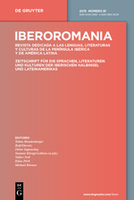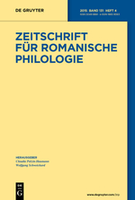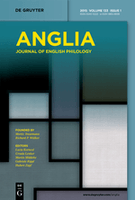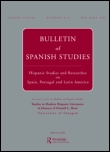
ESTUDIOS FILOLOGICOS
Scope & Guideline
Illuminating Language and Literary Theory
Introduction
Aims and Scopes
- Linguistic Analysis:
The journal frequently publishes studies on various aspects of linguistics, including phonetics, syntax, semantics, and sociolinguistics, focusing on both Spanish and indigenous languages. - Literary Criticism:
A strong emphasis is placed on literary analysis, particularly in relation to contemporary and historical texts from Latin America and Spain, exploring themes, narrative techniques, and cultural contexts. - Cultural Studies:
The journal examines cultural productions, including visual arts and media, in relation to identity, gender, and socio-political issues in Latin America, reflecting on the intersections of culture and society. - Interdisciplinary Approaches:
Contributions often adopt interdisciplinary perspectives, integrating insights from fields such as philosophy, history, and digital humanities, thereby enriching the discussions surrounding language and literature. - Focus on Marginalized Voices:
There is a notable commitment to highlighting marginalized narratives, including feminist, postcolonial, and indigenous perspectives, thereby addressing issues of representation and power dynamics in literature.
Trending and Emerging
- Gender and Sexuality Studies:
There is a significant increase in research focusing on gender and sexuality, particularly in relation to feminist narratives and LGBTQ+ representation in literature, highlighting ongoing societal debates. - Decolonial Perspectives:
Emerging themes include decolonial studies, which interrogate colonial legacies and explore indigenous narratives, as seen in works discussing Mapuche literature and cultural expressions. - Intersectionality in Cultural Analysis:
A growing trend towards intersectionality is evident, with studies examining the interplay of race, class, gender, and sexuality in cultural texts, reflecting a broader commitment to inclusivity and diversity. - Digital Humanities:
The incorporation of digital humanities methodologies is becoming more prominent, with research exploring the implications of digital media and technology on literature and language, indicating an adaptation to contemporary modes of scholarship. - Environmental Humanities:
Recent publications are increasingly engaging with environmental themes, particularly in relation to the Anthropocene and ecological perspectives in literature, showcasing an awareness of global environmental issues.
Declining or Waning
- Traditional Literary Forms:
There has been a noticeable reduction in studies focused on traditional literary forms and canonical texts, as the journal increasingly prioritizes contemporary works and experimental narratives. - Historical Linguistics:
Research rooted in historical linguistics appears less frequently, suggesting a shift towards more contemporary linguistic issues and sociolinguistic dynamics rather than diachronic studies. - Cultural Narratives of the Past:
The examination of historical cultural narratives, particularly those that do not engage with contemporary relevance, has become less prevalent, indicating a preference for current cultural phenomena and their implications. - National Literature Studies:
The scope of studies focusing exclusively on national literature, especially in isolation from broader regional or global contexts, has diminished, reflecting a trend towards more global and comparative analyses. - Formalism in Literary Critique:
Formalistic approaches to literary critique have declined, as there is a growing emphasis on socio-political contexts and reader-response theories that account for the impact of societal factors on literature.
Similar Journals

Impossibilia-Revista Internacional de Estudios Literarios
Illuminating the Inaccessible in Literary AnalysisImpossibilia-Revista Internacional de Estudios Literarios is a premier open access journal dedicated to the vibrant field of literary studies, published by ASSOC CULTURAL IMPOSSIBILIA since 2011. With its ISSN 2174-2464, this international journal encourages the exploration and analysis of diverse literary theories, texts, and contexts, making it an essential resource for researchers, scholars, and students alike. Hailing from Granada, Spain, Impossibilia not only fosters academic discourse in literature but also promotes intercultural dialogue through its commitment to accessibility and inclusivity. While data such as H-index and Scopus rankings are still to be developed, the journal's focus on enriching the literary landscape ensures its growing impact and relevance within the academic community.

IBEROROMANIA
Navigating the Rich Tapestry of Romance Linguistics and LiteratureIBEROROMANIA, published by WALTER DE GRUYTER GMBH, stands as a pivotal journal in the fields of Linguistics and Language and Literature and Literary Theory. Since its inception in 1969, IBEROROMANIA has facilitated scholarly discourse by providing a platform for cutting-edge research that explores the complexities of Romance languages and their literatures. The journal is recognized for its valuable contributions, currently holding a Q3 quartile ranking in Linguistics and Language and a Q2 ranking in Literature and Literary Theory as of 2023. With its diverse scope spanning several years, including works from 1970 to 2024, IBEROROMANIA is pivotal for researchers, professionals, and students alike, fostering a deeper understanding of Romantic linguistic and literary frameworks. Although it does not provide open access, its impact in the Arts and Humanities is underscored by its Scopus rankings, reflecting a commitment to high-quality scholarship. For those dedicated to exploring the nuances of Romance languages and literature, IBEROROMANIA is an indispensable resource.

ZEITSCHRIFT FUR ROMANISCHE PHILOLOGIE
Bridging Historical Insights with Modern Literary DiscourseZEITSCHRIFT FUR ROMANISCHE PHILOLOGIE, published by Walter de Gruyter GmbH, stands as a prominent peer-reviewed journal dedicated to the fields of Linguistics, Literature, and Literary Theory. Established in 1877 and continuing its legacy to the present day, this esteemed journal offers a platform for comprehensive scholarship that explores the intricacies of Romance languages and their literary heritage. With a notable Q1 ranking in Literature and Literary Theory and a Q2 ranking in Linguistics and Language, it has secured its place among leading resources in the humanities. Researchers, educators, and students benefit from its rich historical context and current contributions to the understanding of Romance languages and literature. Though currently not available as Open Access, the journal prioritizes the dissemination of high-quality research, making significant strides in fostering academic dialogue and advancement. Its address at Genthiner Straße 13, Berlin, Germany, situates it in a hub of scholarly activity, bridging the past with contemporary literary discourse.

Verba-Anuario Galego de Filoloxia
Nurturing Language Studies for Tomorrow's ScholarsVerba-Anuario Galego de Filoloxia is a prominent academic journal published by UNIV SANTIAGO COMPOSTELA, dedicated to advancing the field of linguistics and language studies. Hailing from Spain, this journal provides a vital platform for researchers, educators, and students interested in Galician philology and its broader linguistic implications. Although it operates under traditional access models, the journal’s commitment to quality research is reflected in its categorization within Q3 in Linguistics and Language for 2023, showcasing its significant contributions to the field. Encompassing a convergence period from 2017 to 2024, Verba garners attention in both the Arts and Humanities and Social Sciences domains, with its Scopus rankings highlighting its moderate impact within these categories. By nurturing scholarly dialogue and disseminating innovative studies, Verba-Anuario Galego de Filoloxia plays a crucial role in promoting linguistic research, making it an essential resource for professionals and academic institutions striving to explore the complexities of language and philology.

Studia z Filologii Polskiej i Slowianskiej
Exploring the Depths of Slavic LinguisticsStudia z Filologii Polskiej i Slowianskiej is a prominent journal published by the Polish Academy of Sciences, Institute of Slavic Studies, focusing on the rich and diverse field of linguistics and language studies, particularly within the Slavic context. With the ISSN 0081-7090 and E-ISSN 2392-2435, this open-access journal has been a valuable resource for researchers, professionals, and students since its transition to an open-access model in 2014. It features rigorous peer-reviewed articles that contribute to the understanding of linguistic phenomena and cultural narratives across Slavic languages. Recognized within the Q3 quartile of linguistics and language in 2023, it ranks at the intersection of arts, humanities, and social sciences, providing insights that echo through disciplines such as sociolinguistics, psycholinguistics, and philology. In its ongoing publication trajectory from 2011 to 2023, Studia z Filologii Polskiej i Slowianskiej continues to foster academic discourse and collaboration, positioning itself as a key player in the global linguistic community.

Filologia Mediolatina
Advancing Scholarship in Medieval PhilologyFilologia Mediolatina is an esteemed academic journal dedicated to the study of Medieval Latin philology, published by SISMEL EDIZIONI GALLUZZO in Italy. With an ISSN of 1124-0008, this journal provides a critical platform for researchers, professionals, and students to explore the intricate relations between language, culture, and textual analysis in the medieval period. Although its impact factor is not specified, Filologia Mediolatina falls within the Q4 category in the Linguistics and Language field as of 2023 and holds a notable rank in the arts and humanities sector, highlighting its niche yet vital role in the academic community. The journal offers insights into linguistic evolution and historical texts, making it a valuable resource for those engaged in these disciplines. It has continued to publish relevant articles from 2015 to 2023, contributing to scholarly discussions and enriching the knowledge base in medieval studies.

ANGLIA-ZEITSCHRIFT FUR ENGLISCHE PHILOLOGIE
Illuminating the Path of English Linguistic ResearchANGLIA-ZEITSCHRIFT FUR ENGLISCHE PHILOLOGIE, published by WALTER DE GRUYTER GMBH, stands as a significant periodical in the fields of Linguistics and Literary Theory. With a rich publication history dating back to 1878 and ongoing contributions until 2024, this esteemed journal serves as a vital resource for researchers, professionals, and students interested in the evolution of the English language and literature. Although it does not currently offer open access, its rigorous peer-reviewed articles have secured a respectable standing, ranking Q3 in Linguistics and Language and Q2 in Literature and Literary Theory as of 2023. The journal, located in Berlin, Germany, continues to drive academic discourse and foster scholarly engagement in the intricacies of English philology, making it an essential platform for the latest research and developments in the field.

Dirasat Hispanicas-Revista Tunecina de Estudios Hispanicos
Championing Diverse Voices in Hispanic ScholarshipDirasat Hispanicas-Revista Tunecina de Estudios Hispanicos is a pivotal academic journal published by UNIV TUNIS MANAR, INST SUPERIEUR SCIENCES HUMAINES TUNIS, dedicated to the exploration and analysis of Hispanic studies within the broader context of history, linguistics, and literature. Established in Tunisia, this journal has transitioned to an Open Access model since 2014, promoting the dissemination of knowledge and fostering scholarly exchange among researchers, professionals, and students globally. With its ISSN 2286-5977 and esteemed recognition in various categories, including Q4 in History and Linguistics and Q3 in Literature and Literary Theory, Dirasat Hispanicas strives to bridge gaps in Hispanic scholarship by inviting diverse critical perspectives and innovative research. While its Scopus rankings reflect an evolving presence in the academic landscape, the journal remains committed to enhancing the visibility and impact of Hispanic studies. The journal continues to encourage submissions that contribute to its mission of intellectual advancement, making it an essential resource for those engaged in the rich tapestry of Hispanic cultural and linguistic heritage.

RILCE-Revista de Filologia Hispanica
Elevating Academic Discourse in Linguistics and LiteratureRILCE-Revista de Filologia Hispanica is a distinguished academic journal published by the Universidad de Navarra, serving as a pivotal platform for scholarship in the field of Hispanic Philology. Established in 2008 and ongoing through 2024, RILCE stands out in the academic community with a robust reputation reflected in its 2023 ranking; it holds Q2 status in Linguistics and Language and Q1 in Literature and Literary Theory. The journal is indexed in Scopus, where it ranks 165th out of 1106 in Literature and Literary Theory, showcasing its significant impact with an 84th percentile ranking. Located in Pamplona, Spain, RILCE aims to foster critical dialogues and disseminate innovative research that advances the understanding of linguistic and literary studies, making it an essential resource for researchers, professionals, and students alike. Although specific open access options may be limited, RILCE remains committed to enriching the academic dialogue within its disciplines.

Bulletin of Spanish Studies
Enriching Understanding of Spain's Cultural LandscapeBulletin of Spanish Studies is a prominent academic journal dedicated to the exploration and discourse of Spanish studies within the diverse realms of Cultural Studies and Literature and Literary Theory. Published by Routledge Journals, Taylor & Francis Ltd, this journal serves as a crucial platform for scholars, researchers, and students to disseminate their findings and engage in scholarly debates related to Spanish literature, culture, and linguistics. With an emphasis on high-quality, peer-reviewed research, the journal holds a reputable Q3 ranking in Cultural Studies and a commendable Q2 ranking in Literature and Literary Theory, reflecting its significant impact within the academic community. The Bulletin is indexed in notable databases, achieving a rank of #314 out of 1106 in Literature and Literary Theory and #738 out of 1304 in Cultural Studies, signaling its vital role in advancing knowledge in these fields. Although it does not currently offer open access options, the journal remains an essential resource for those passionate about the study of Spanish culture and literature from 2010 to 2024 and beyond.